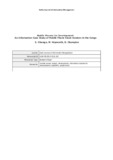- CERES Home
- →
- School of Management (SoM)
- →
- Staff publications (SoM)
- →
- View Item
JavaScript is disabled for your browser. Some features of this site may not work without it.
| dc.contributor.author | Cibangu, Sylvain K. | |
| dc.contributor.author | Hepworth, Mark | |
| dc.contributor.author | Champion, Donna | |
| dc.date.accessioned | 2017-03-27T10:28:07Z | |
| dc.date.available | 2017-03-27T10:28:07Z | |
| dc.date.issued | 2017 | |
| dc.identifier.citation | Cibangu S, Hepworth M, Champion D. (2017) Mobile phones for development: an information case study of mobile phone kiosk vendors in the Congo. Aslib Journal of Information Management, 2017, Volume 69, Issue 3, pp. 294-315 | en_UK |
| dc.identifier.issn | 2050-3806 | |
| dc.identifier.uri | http://dx.doi.org/10.1108/AJIM-09-2016-0151 | |
| dc.identifier.uri | http://dspace.lib.cranfield.ac.uk/handle/1826/11657 | |
| dc.description.abstract | Purpose – The paper relays an important line of Mark Hepworth’s work, which engages with information technologies and development. The paper aims to suggest a subfield of Library and Information Science (LIS) for development to reclaim the role of information services and systems for social change in rural areas. The paper looks at the extent of development gained with the advent of mobile phones. Design/methodology/approach – Rather than undertaking traditional large-scale, quantitative, context-independent and survey-type research, the paper employs a capability approach and semi-structured interviews to ascertain the experiences that mobile phone kiosk vendors in the rural Congo have of mobile phones. Findings – It was found that (1) mobile phones should be geared towards the liberation, and not utilization or commodification of humans and their needs, and (2) mobile phones are not a catalyst of human basic capabilities. Practical implications – The paper provides empirical evidence as to how an important group of mobile phone users could harness development with their mobiles. Research limitations/implications – Since the method employed is an in-depth qualitative analysis of mobile phone kiosk vendors, obtained results can be used to enrich or inform mobile phone experiences in other settings and groups. Originality/value – Most LIS literature has presented mobile phones along the lines of information freedom or access, mass subscription, adoption rates, technological and entrepreneurial innovation, micro-credits, etc. However, this paper places development at the heart of LIS debates. | en_UK |
| dc.language.iso | en | en_UK |
| dc.publisher | Emerald | en_UK |
| dc.rights | Attribution-NonCommercial 4.0 International | |
| dc.rights.uri | http://creativecommons.org/licenses/by-nc/4.0/ | |
| dc.subject | mobile phones | en_UK |
| dc.subject | impact | en_UK |
| dc.subject | development | en_UK |
| dc.subject | nformation science for development | en_UK |
| dc.subject | capability | en_UK |
| dc.subject | prepaid card | en_UK |
| dc.subject | Library and Information Science (LIS) | en_UK |
| dc.title | Mobile phones for development: an information case study of mobile phone kiosk vendors in the Congo | en_UK |
| dc.type | Article | en_UK |
Files in this item
This item appears in the following Collection(s)
-
Staff publications (SoM) [1269]

